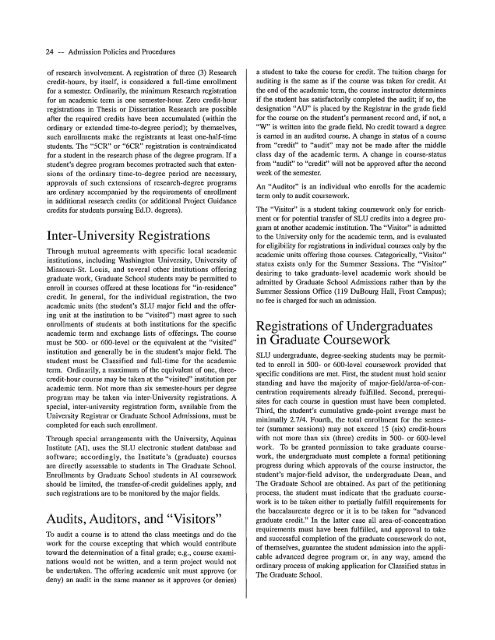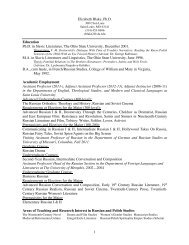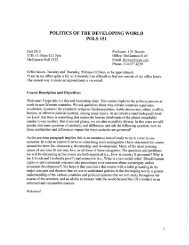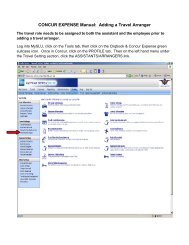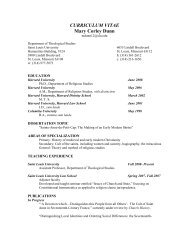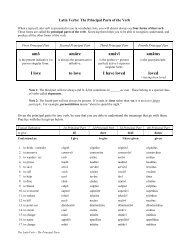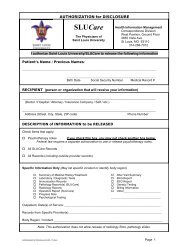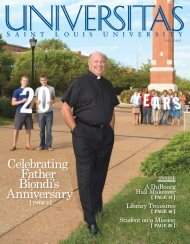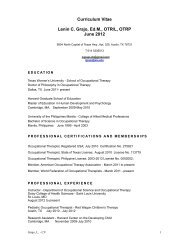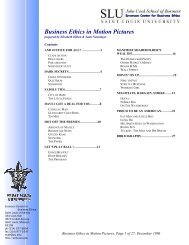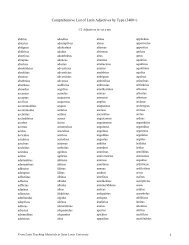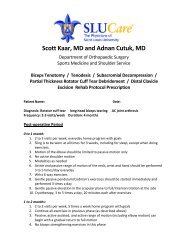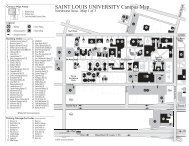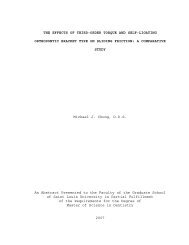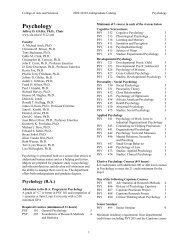Program Manual - Saint Louis University
Program Manual - Saint Louis University
Program Manual - Saint Louis University
Create successful ePaper yourself
Turn your PDF publications into a flip-book with our unique Google optimized e-Paper software.
24 Admission Policies and Procedures<br />
of research involvement. A registration of three (3) Research<br />
credit-hours, by itself, is considered a full-time enrollment<br />
for a semester. Ordinarily, the minimum Research registration<br />
for an academic term is one semester-hour. Zero credit-hour<br />
registrations in Thesis or Dissertation Research are possible<br />
after the required credits have been accumulated (within the<br />
ordinary or extended time-to-degree peIiod); by themselves,<br />
such enrollments make the registrants at least one-half-time<br />
students. The "5CR" or "6CR" registration is contraindicated<br />
for a student in the research phase of the degree program. If a<br />
student's degree program becomes protracted such that extensions<br />
of the ordinary time-to-degl'ee period are necessary,<br />
approvals of such extensions of research-degree programs<br />
are ordinary accompanied by the requirements of enrollment<br />
in additional research credits (or additional Project Guidance<br />
credits for students pursuing Ed.D. degrees).<br />
Inter-<strong>University</strong> Registrations<br />
Through mutual agreements with specific local academic<br />
institutions, including Washington <strong>University</strong>, <strong>University</strong> of<br />
Missouri-St. <strong>Louis</strong>, and several other institutions offering<br />
graduate work, Graduate School students may be permitted to<br />
enroll in courses offered at these locations for "in-residence"<br />
credit. In general, for the individual registration, the two<br />
academic units (the student's SLU major field and the offering<br />
unit at the institution to be "visited") must agree to such<br />
enrollments of students at both institutions for the specific<br />
academic term and exchange lists of offerings. The course<br />
must be 500- or 600-level or the equivalent at the "visited"<br />
institution and generally be in the student's major field. The<br />
student must be Classified and full-time for the academic<br />
term. Ordinarily, a maximum of the equivalent of one, threecredit-hour<br />
course may be taken at the "visited" institution per<br />
academic telm. Not more than six semester-hours per degree<br />
program may be taken via inter-<strong>University</strong> registrations. A<br />
special, inter-university registration form, available from the<br />
<strong>University</strong> Registrar or Graduate School Admissions, must be<br />
completed for each such enrollment.<br />
Through special arrangements with the <strong>University</strong>, Aquinas<br />
Institute (Al), uses the SLU electronic student database and<br />
software; accordingly, the Institute's (graduate) courses<br />
are directly assessable to students in The Graduate School.<br />
Enrol1ments by Graduate School students in Al coursework<br />
should be limited, the transfer-of-credit guidelines apply, and<br />
such registrations are to be monitored by the major fields.<br />
Audits, Auditors, and "Visitors"<br />
To audit a course is to attend the class meetings and do the<br />
work for the course excepting that which would contribute<br />
toward the determination of a final grade; e.g., course examinations<br />
would not be written, and a term project would not<br />
be undertaken. The offering academic unit must approve (or<br />
deny) an audit in the same manner as it approves (or denies)<br />
a student to take the course for credit. The tuition charge for<br />
auditing is the same as if the course was taken for credit. At<br />
the end of the academic term, the course instructor determines<br />
if the student has satisfactorily completed the audit; if so, the<br />
designation "AU" is placed by the Registrar in the grade field<br />
for the course on the student's permanent record and, if not, a<br />
"w" is written into the grade field. No credit toward a degree<br />
is earned in an audited course. A change in status of a course<br />
from "credit" to "audit" may not be made after the middle<br />
class day of the academic term. A change in course-status<br />
from "audit" to "credit" will not be approved after the second<br />
week of the semester.<br />
An "Auditor" is an individual who enrol1s for the academic<br />
term only to audit coursework.<br />
The "Visitor" is a student taking coursework only for elll'ichment<br />
or for potential transfer of SLU credits into a degree program<br />
at another academic institution. The "Visitor" is admitted<br />
to the <strong>University</strong> only for the academic term, and is evaluated<br />
for eligibility for registrations in individual courses only by the<br />
academic units offering those courses. Categorically, "Visitor"<br />
status exists only for the Summer Sessions. The "Visitor"<br />
desiring to take graduate-level academic work should be<br />
admitted by Graduate School Admissions rather than by the<br />
Summer Sessions Office (119 DuBourg Hal1, Frost Campus);<br />
no fee is charged for such an admission.<br />
Registrations of Undergraduates<br />
in Graduate Coursework<br />
SLU undergraduate, degree-seeking students may be pennitted<br />
to enroll in 500- or 600-level coursework provided that<br />
specific conditions are met. First, the student must hold senior<br />
standing and have the majority of major-field/area-of-concentl'ation<br />
requirements already fulfilled. Second, prerequisites<br />
for each course in question must have been completed.<br />
Third, the student's cumulative grade-point average must be<br />
minimally 2.7/4. Fourth, the total enrollment for the semester<br />
(summer sessions) may not exceed 15 (six) credit-hours<br />
with not more than six (three) credits in 500- or 600-level<br />
work. To be granted permission to take graduate coursework,<br />
the undergraduate must complete a formal petitioning<br />
progress during which approvals of the course instructor, the<br />
student's major-field advisor, the undergraduate Dean, and<br />
The Graduate School are obtained. As part of the petitioning<br />
process, the student must indicate that the graduate coursework<br />
is to be taken either to partially fulfill requirements for<br />
the baccalaureate degree or it is to be taken for "advanced<br />
graduate credit." In the latter case all area-of-concentration<br />
requirements must have been fulfilled, and approval to take<br />
and successful completion of the graduate course work do not,<br />
of themselves, guarantee the student admission into the applicable<br />
advanced degree program or, in any way, amend the<br />
ordinary process of making application for Classified status in<br />
The Gl'aduate School.


